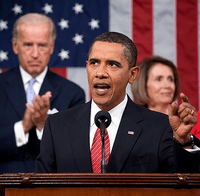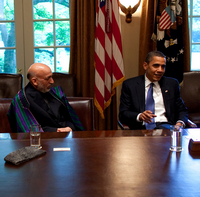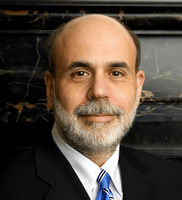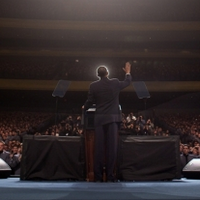Russia and India continue to bolster ties through a nuclear agreement.Russian President Dmitry Medvedev has stressed that nuclear cooperationbetween the two nations is only for peaceful collaboration and thatRussia does not intend to expand the nuclear club. Prime MinisterManmohan Singh was in Moscow for the leaders’ third meeting this year.
Asia-Pacific Archive
Free Newsletter
President Barack Obama’s plan to send 30,000 troops to Afghanistan bymid-2010 — with withdrawal plans for July 2011 — may provide someassurances to Afghanistan’s neighbors. Analysts say that a withdrawaldate is not necessarily the ideal situation, but will help givePakistan some idea of when an end may be in sight. VOA’s Ravi Khannareports on how a withdrawal date may be the key to a risky strategy.

Conservative voices are being raised against what defense hawks consider to be the Democrats’ ulterior motive in addressing health care in America: a none-too-subtle long-term plot to curtail U.S. defense spending and thus render our military forces as strategically impotent as those of our NATO allies. This charge is at once hypocritical and correct, but not for the dark reasons ascribed to the Obama administration. Instead, the Democrats’ implied plot to rebalance domestic versus foreign spending merely responds to America’s demographic trends, while revealing — quite uncomfortably, for defense hawks — the shifting correlation of forces across the global security […]

The president and his national security team have outlined an ambitious strategy for Afghanistan. But if they hope to meet their July 2011 target date for the beginning of a U.S. drawdown, they will have to navigate some unavoidable roadblocks along the way. The first — and most pressing — is the continued weakness of the government of Afghan President Hamid Karzai. Some commentators have written that the withdrawal of presidential candidate Abdullah Abdullah from the second round of elections this past fall has cleared the way for Karzai — with U.S. support and aid — to begin necessary reforms. […]
As I suggested, the fact that President Barack Obama stated in his West Point address that he was “confident” additional forces would be forthcoming from NATO allies was a tip-off that assurances had been made. Still, there’s a reason why the NY Times calls them “new troops,” even if you had to read the WSJ’s report to understand why: About half of the pledged troops are already in Afghanistan, as part of last spring’s Afghan election surge, and simply won’t be withdrawn as scheduled. There’s also something else that the Times didn’t bother to mention, and the Journal glossed over, […]
NewsHour’s Jim Lehrer interviews Defense Secretary Robert Gates aboutthe new strategy in Afghanistan. Gates says that he has signeddeployment papers for the first wave of the 30,000 troops to leave in acouple of weeks. He also says President Obama’s 2011 exit date iscontingent upon the conditions on the ground and is not necessarilyfirm.

Low interest rates have become something of a staple at the U.S. Federal Reserve in recent years. However, early last month, the U.S. central bank took its “cheap dollar” policy to another level by committing to near-zero interest rates for the foreseeable future. The Fed’s decision has its roots in domestic economic goals: With American unemployment hovering above 10 percent, low rates are seen as a way to jump-start bank lending to businesses — a necessary first step in getting these firms to increase staffing. Low rates also make it cheaper to buy a home and should help the U.S. […]
General Stanley McChrystal brings the new Afghanistan policy toofficers on the ground in Kandahar. In his presentation, the topcommander in Afghanistan said “I think it’s the end of the beginning.”He then proceeded to lay out President Obama’s plan to add 30,000 moretroops and to focus efforts on southern Afghanistan. Al Jazeera’sClayton Swisher reports on McChrystal’s message to troops.
There are a number of revealing aspects to the reactions of various NATO allies to President Barack Obama’s call for more troops for Afghanistan. First, last week’s reported telephone call to Italian Prime Minister Silvio Berlusconi makes more sense in light of Italy’s initial signals that it will deploy between 500-1,500 additional troops to Afghanistan. The troops will actually be redeployed from other theaters of operation (Kosovo and Lebanon) according to previous drawdown schedules there. So nothing immediate (the second half of 2010), but probably in line with the U.S. deployment schedule. It’s also a bold political move on Berlusconi’s […]
We collected a range of reactions to President Barack Obama’s new Afghanistan strategy rollout over at WPR’s video section that should be of interest: In case you missed it, here is Obama’s full speech from West Point. Afghans show skepticism in this Al Jazeera video. Jim Lehrer, David Brooks and Mark Shields examine the president’s speech in this video. British Prime Minister Gordon Brown and conservative leader David Cameron get into a heated discussion in this video. Our video sectionis updated daily. I’ll highlight videos we post there from time to timeon this blog. Got a tip for where we […]
Afghan civilians are skeptical of the strategy introduced by PresidentBarack Obama in a speech at West Point. A quick man-on-the-streetsurvey by Al Jazeera shows that Afghans believe that their country’sissues must be dealt with from within in concert with Islamic nationsthat they feel they can trust. A Taliban spokesman commented that moretroops will just mean a bigger target. David Chater reports for AlJazeera.
The New York Times’ David Brooks and syndicated columnist Mark Shieldsdiscuss President Obama’s speech at West Point with NewsHour’s JimLehrer. Brooks says that Obama was reserved in his speech and presentsa war that is unique from past conflicts. Shields agrees and says thatthe choice of venue made the president’s words all the more somber.

The success or failure of President Barack Obama’s new Afghanistan strategy will depend on numerous international factors, from the contributions of Washington’s NATO allies to the performance of Afghanistan’s beleaguered government. However, few factors loom larger than Pakistan. Indeed, the Obama administration has conceded that unless Islamabad intensifies its efforts against Taliban and al-Qaida forces based in Pakistan, the Afghanistan plan will likely fail. Predictably, the U.S. government has renewed pressure on Pakistan to launch a more aggressive campaign against militancy within its borders. However, Washington has little credibility and leverage in Pakistan, and Pakistani mistrust of the United States […]
British conservative leader David Cameron clashes with Prime MinisterGordon Brown over troop commitment in Afghanistan. Cameron asked Brownpointedly when he expected there to be a decrease in British troops inAfghanistan. Brown responded by saying that he expected the balance ofcoalition forces and Afghan forces to shift in 2011.

President Barack Obama offered a well-articulated if somewhat hazy vision last night of his plans to stabilize the deteriorating security situation in Afghanistan. The core idea is to increase foreign support for the Afghan government and security forces in order to allow them to develop the capacity to improve governance and confront the Taliban insurgency more independently. The basic problem with implementing this strategy is that the Afghan government and security forces continue to experience numerous difficulties. In addition, the administration’s other sought-after foreign partners are either leaving the field of battle or refusing to enter it. In order for […]
In a nutshell, President Barack Obama delivered a very effective — if imperfect — speech last night, outlining in appropriate detail the reasons for both the war’s ongoing significance and the announced troop increase, the overall objectives and approach, and to a lesser degree the regional context. Most importantly, he embedded the entire discussion into a compelling vision of balancing America’s national security interests with its broader national interests, while placing both in the context of America’s enduring yet changing global role. By appropriate detail, I mean that there wasn’t much, but that’s not what this speech was about. As […]
